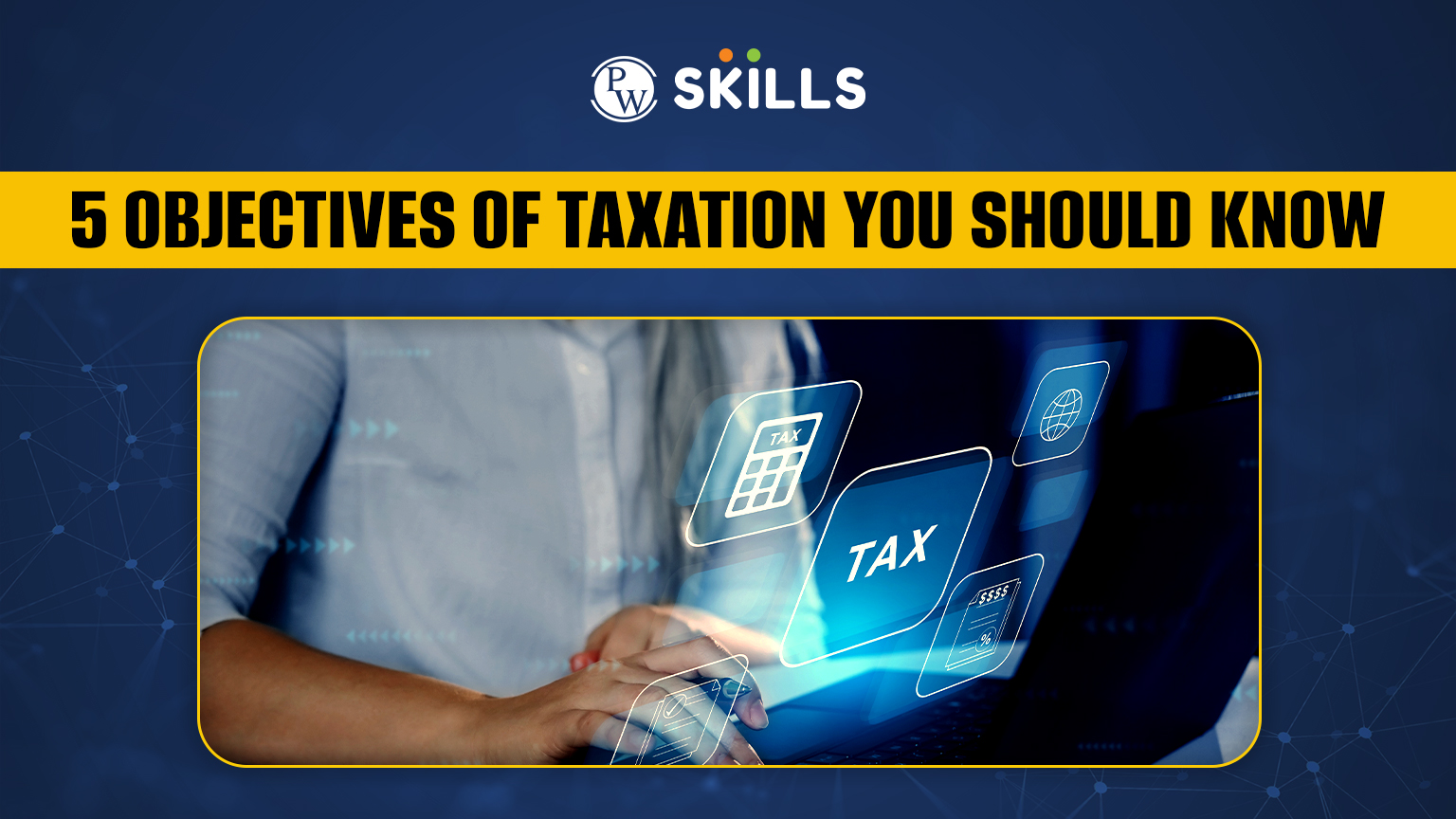Objectives of Taxation: Have you ever considered why we pay taxes and how they shape our economy? Taxation serves purposes beyond merely generating revenue for the government. Taxes are a powerful tool in shaping economic policies, impacting everything from production to income distribution.
As Oliver Wendell Holmes Jr. said, “Taxation is the price we pay for a civilized society.” In India, the objectives of taxation serve not only to finance public programs but also to manage economic growth and reduce inequality.
Understanding the five objectives of taxation helps us see how taxes influence everything, from social welfare to financing decisions. Here, we’ll explain the objectives of taxation and highlight the top 5 objectives of taxation in India.
What are the Objectives of Taxation?
The objectives of taxation focus on generating revenue for public services, reducing wealth inequality, regulating economic activities, promoting social welfare, and ensuring economic stability. In India, taxes are categorized as direct (e.g., income tax) or indirect (e.g., GST). Direct taxes are paid by individuals or companies based on income or profits, while indirect taxes are paid by consumers on goods and services.
For example, income tax supports infrastructure projects, while GST funds social welfare programs. The objectives of taxation in India also include fostering balanced regional growth and encouraging sustainable development through fiscal policies.
Also Read: Benefits of Enrolling in an Online Tax Course
Top 5 Objectives of Taxation in India
Taxation is crucial in shaping and strengthening a country’s economy. In India, it serves multiple purposes beyond just raising revenue for the government. Here, we explore the objectives of taxation in India and how they contribute to economic growth and stability:
1. Promoting Economic Development
Economic development is one of the primary objectives of taxation. By mobilizing tax revenues, the government fosters capital formation, which is critical for a country’s progress.
- Why is it important? Less developed countries often lack capital, hindering growth. Taxes help bridge this gap by funding public and private investments.
- How is it achieved? Through strategic tax planning, the government increases the savings-to-income ratio, ensuring resources are directed towards productive sectors like infrastructure.
2. Maintaining Price Stability
Taxes are a powerful tool to control inflation and deflation, ensuring price stability in the market.
- Controlling inflation: By increasing direct taxes, disposable income decreases, reducing demand and easing pressure on the market.
- During deflation: Lowering taxes encourages spending and stimulates demand, supporting economic recovery.
For instance, imposing higher taxes on luxury goods during inflation can reduce excessive consumption while protecting essential goods.
3. Achieving Full Employment
Tax policies can directly impact employment levels by influencing effective demand.
- Encouraging spending: Reduced tax rates increase disposable income, leading to higher demand for goods and services.
- Boosting investments: Increased demand drives businesses to invest more, creating jobs and boosting income through the multiplier effect.
For example, tax incentives for industries can stimulate job creation in sectors like manufacturing.
4. Regulating Trade and Improving Balance of Payments
Taxation helps manage trade imbalances and supports the domestic economy by controlling imports and encouraging local production.
- How does it work? Import duties and tariffs discourage excessive reliance on foreign goods while promoting the use of locally produced alternatives.
- Outcome: This approach strengthens domestic industries and reduces the balance of payment challenges.
For example, higher import duties on luxury items can limit their demand and simultaneously boost the production of similar goods within the country.
5. Reducing Wealth Inequality
An important objective of taxation in India is to bridge the gap between the rich and the poor.
- Progressive taxation: Higher tax rates for the wealthy ensure a fair contribution.
- Redistribution: Tax revenue funds public services like education and healthcare, benefitting the underprivileged.
For example, progressive income tax systems help reduce income disparities and promote social equity.
Also Read: How to Become a Tax Consultant in India?
Taxation is more than just a source of revenue; it is a tool to achieve economic stability, social justice, and national growth. These five objectives of taxation highlight its importance in building a balanced and thriving economy.
Moreover, understanding the objectives of taxation helps us appreciate its broader impact on our lives and the country’s progress.
Learn Finance, Taxation & Accounting With PW Skills
The PW Skills Certification Program in Finance, Tax, and Accounting (CPFTA) is a comprehensive four-month online course, developed in collaboration with PwC India. This program covers essential topics in taxation, finance, and accounting, providing a solid foundation for a career in finance.
The CPFTA Course offers several key benefits:
- Industry-Relevant Curriculum: Stay updated with current trends, crafted in collaboration with PwC India.
- Professional Certification: Earn a certificate from PwC India to boost your career credentials.
- Expert Guidance: Gain insights from seasoned professionals with extensive experience in the field.
- Practical Learning: Work with real-life case studies and financial scenarios.
- Finance Tools Training: Get practical experience using tools such as Zoho Books and Excel.
Explore the objectives of taxation and other essential finance concepts in the PW Skills Tax and Accounting Online Course. Enroll today and begin your journey to advance your career!
Taxation is the process through which the government collects money from individuals and businesses to fund public services like education, healthcare, infrastructure, and defense. It helps maintain the functioning of the economy and government operations. The top five objectives of taxation in India are: generating revenue, reducing income inequality, stabilizing the economy, promoting economic growth, and regulating imports. Taxes help the government finance public programs and balance economic activities. The seven principles of taxation are: Equity, Flexibility, Economic efficiency, Simplicity, Diversity, Certainty, and Utmost good faith. These principles guide the design of a fair, effective, and transparent tax system that meets the needs of society. Studying taxation helps you understand how taxes affect the economy, businesses, and individuals. It also teaches you how tax policies influence financial decisions, government budgets, and social welfare, making it essential for personal and professional growth. Taxes are generally classified into two types: direct taxes, which are paid directly by individuals or businesses (e.g., income tax, corporate tax), and indirect taxes, which are levied on goods and services (e.g., GST, excise duties).Objectives of Taxation FAQs
What is taxation?
What are the main five objectives of taxation in India?
What are the 7 principles of taxation?
Why is studying taxation important?
What are the different types of taxes?


